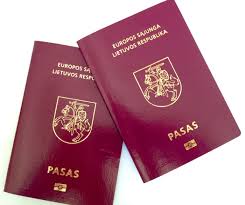

Vilnius, December 25, BNS–After the law was amended to provide greater opportunities to Jews who left Lithuania between the wars to restore citizenship, several hundred requests for Lithuanian citizenship have been granted.
The Lithuanian Migration Department reports following amendments adopted in April of 2016, Lithuanian citizenship was restored to 223 people of Jewish ethnicity through the third quarter of the year. Of these, 209 held Israeli citizenship and 14 South African. No applications were rejected. A significant portion of requests have not been processed yet, but Migration Department representatives said the trend continues for the fourth quarter and citizenship should be restored for another 200 people.
Citizenship was also granted to 36 people whose applications had been rejected earlier. Before the new law came into effect, both the number of requests granted and requests rejected were growing annually. In 2014 10 were rejected, in 2015 76, and in the first half of 2016 105 applications by Litvaks for restoration of Lithuanian citizenship were rejected. Correspondingly, in 2014 528 cases of restoration of citizenship to Jews were granted, in 2015 602, but in the first half of 2016 just 125 people of Jewish ethnicity received positive answers.
“As early as the beginning of the year we knew there would be some sort of changes, so we froze potentially negative decisions. When the new law was adopted, we renewed the frozen cases, so that perhaps explains why the positive decisions increased. But there is no flood,” Migration Department director Evelina Gudzinskaitė told BNS.
She said there are three main reasons Litvak descendants seek Lithuanian citizenship. “For some there is a symbolic tie to Lithuania, they want to restore citizenship, to have it, they want to maintain their roots. For some they need it for practical reasons, they want to come back here, they’re involved in cemetery protection, restoration of synagogues, they are concerned with heritage which still survives here, they want to visit [heritage sites]… A Lithuanian passport is also citizenship in the European Union, so there’s the opportunity to arrive in the EU, to travel more easily,” she commented
In April the law was changed to make it more explicit, following a new procedure by migration officials and courts demanding Litvaks provide proof they or their ancestors were persecuted in Lithuania during the period between the two world wars. The matter revolved around a nuance in meaning, between the words “fled” and “withdrew.” Both cases are now covered in the new language.

